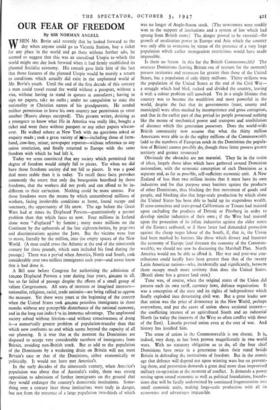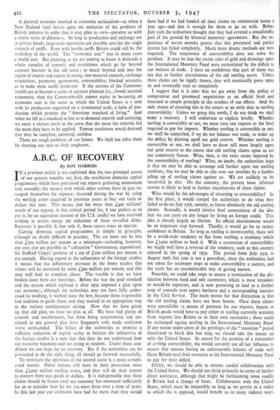OUR FEAR OF FREEDOM
By SIR NORMAN ANGELL
WHEN Mr. Bevin said recently that he looked forward to the day when anyone could go to Victoria Station, buy a ticket for any place in the world and go there without further ado, he seemed to suggest that this was an unrealised Utopia to •which the world might one day look forward when it had firmly established its planned Socialist economy. His remark gave little hint of the fact that those features of the planned Utopia would be merely a return to conditions which actually did exist in the unplanned world of Mr. Bevin's youth. Until the end of the first decade of this century a man could travel round the world without a passport, without a visa, without having to stand in queues at consulates ; having to sign no papers, take no oaths ; under no compulsion to state the nationality or Christian names of his grandparents. He needed neither permission to leave his own country nor permission to enter another (Russia always excepted). This present writer, desiring as a youngster to know what life in America was really like, bought a ticket and went there without passport or any other papers whatso- ever. He walked ashore at New York with no questions asked or enquiry made ; took a great variety of j■bs—including those of farm- hand, cow-boy, miner, newspaper reporter—without reference to any union restriction, and finally returned to Europe with the same freedom with which he had left it.
Today we seem convinced that any society which permitted that degree of freedom would simply fall to pieces. Yet when we did have those freedoms society did not fall to pieces. It was a good deal more stable than it is today. To recall these facts provokes commonly the retort that only the bourgeoisie benefited by those freedoms, that the workers did not profit and can afford to be in- different to their extinction. Nothing could be more untrue. For those freedoms were the means by which unnumbered millions of workers, facing intolerable conditions at home, found escape and sanctuary, the opportunity of life anew. The age before the Great Wars had at times its Displaced Persons—quantitatively a greater problem than that which faces us now. Four millions in Ireland alone were "displaced " by famine ; many more millions on the Continent by the upheavals of the late eighteen-forties, by pogroms and discriminations against the Jews. But the victims were free to move, literally by the million, into the empty spaces of the New World. (A man could cross the Atlantic at the end of the nineteenth century for three pounds, which sum included his food during the passage.) There was a period when America, North and South, took considerably over two million immigrants each year—and never knew that it had done it.
A Bill now before Congress for authorising the .admission of too,000 Displaced Persons a year during four years, 400,000 in all, has so far failed of passage despite the efforts of a small group of valiant Congressmen. All sorts of interests or imagined interests— nationalist, religious, racial, trade unionist—are being rallied to oppose the measure. Yet there were years at the beginning of the century when the United States took 400,000 penniless immigrants in three months without any perceptible disturbance of the national economy, and in the long run indee4 .o its immense advantage. The unplanned society solved without friction—and without consciousness of doing it—a numerically greater problem of populatioh-transfer than that which now confronts us and which seems beyond the capacity of all our planning. It is true that at the moment the Dominions are disposed to accept very considerable numbers of immigrants from Britain, avoiding non-British stock. But to add to the population of the Dominions by a weakening drain on Britain will not meet Britain's case or that of the Dominions, either economically or politically. It would not have met America's.
In the early decades of the nineteenth century, when America's population was about that of Australia's today,' there was strong opposition to admission of further immigrants on the ground that they would endanger the country's democratic institutions. Some- thing over a century later those institutions were truly in danger, but not from the presence of a large population two-thirds of which was no longer of Anglo-Saxon stock. (The newcomers were readily won to the support of institutions and a system of law which had sprung from British roots.) The danger proved to be external—the growth of totalitarian power in Europe and Asia which the country was only able to overcome by virtue of the presence of a very large population which earlier immigration restrictions would have made impossible.
Is there no lesson in this for the British Commonwealth? The overseas Dominions (leaving Britain out of account for the moment) possess territories and resources far greater than those of the United States, but a population of only thirty millions. Thirty millions was the population of the United States at the end of the Civil War—, a struggle which had bled, racked and divided the country, leaving it with a colour problem still unsolved. Yet in a single lifetime that country was to become the wealthiest and most powerful in the world, despite the fact that its governments (state, county and municipal) were often marked by incompetence and gross corruption, and that in the earlier part of that period its people possessed nothing like the means of mechanical power and transport and annihilation of distance which this generation possesses. Does the world-wide British community now assume that what the thirty million Americans were able to do the eighty millions of the Commonwealth (add to the numbers of European stock in the Dominions the popula- tion of Britain) cannot possibly do, though these latter possess greater territory and greater resources?
Obviously the obstacles are not material. They lie in the realm of ideas, largely those ideas which have gathered around Dominion nationalism, with the economic conception of each Dominion as a separate and, as far as possible, self-sufficient economic unit. A New Zealand of less than two million insists that it must have its own industries and for that purpose erect barriers against the products of other Dominions, thus blocking the free movement of goods and people, and blocking also that large-scale production by which alone the United States has been able to build up its stupendous wealth. If state-conscious and state-proud Californians or Texans had insisted upon excluding the products of Detroit or Pittsburg in order to develop similar industries of their own ; if the West had insisted upon the protection of its infant industries against the older states of the Eastern seaboard, or if these latter had demanded protection against the cheap negro labour of the South, if, that is, the Union had been marked by barriers like those which dissect and frustrate the economy of Europe (and threaten the economy of the Common- wealth), we should not now be discussing the Marshall Plan. North America would not be able to afford it. Her war and post-war con- tributions could hardly have been greater than that of the twenty Latin American nations—who, incidentally and significantly, between them occupy much more territory than does the United States. (Brazil alone has a greater land area.)
Time was, of course, when the original states of the Union did possess each its own tariff, currency laws, defence organisation. It was a conception of the state and its rights of independence which finally exploded into devastating civil war. But a great leader saw that union was the price of democracy in the New World, perhaps everywhere, and put the cause of union above sectional interest— the conflicting interest of an agricultural South and an industrial North (as today the interests of the West so often conflict with those of the East). Lincoln pressed union even at the cost of war. And history has justified him.
The sense of union in the Connnonwealth is not absent. It is, indeed, very deep, as has been proven magnificently in two world wars. With no statutory obligation so to do, all the four chief Dominions have twice in a generation taken their stand beside Britain in defending the institutions of freedom. But in the atomic age that defence will depend not upon winning wars but on prevent- ing them, and prevention demands a great deal more than improvised military co-operation at the moment of conflict. It demands a power resting upon sound' economic as well as political foundations, founda- tions that will be fatally undermined by continued fragmentation into small economic units, making large-scale production with all its economies and advantages impossible. A planned economy married to economic nationalism—as when a New Zealand (say) insists upon the exclusion of the products of British industry in order that it may plan its own—presents us with a whole series of dilemmas. So long as production and exchange are in private hands, large-scale operations are possible save for the single obstacle of tariffs. Even with hostile tariffs Britain could still be the workshop of the world. The "economic unit" was in many cases a world unit. But planning as we are coming to know it demands a whole complex of controls and restrictions which go far beyond customs barriers in the old sense ; so much beyond and into the region of import and export licensing, raw-material controls, exchange restrictions, payments agreements, convertibility, blocked accounts, as to make mere tariffs irrelevant. If the nations of the Common- wealth are to become a series of separate planned (i.e., closed) national economies, then the Commonwealth cannot aspire to becoming an economic unit in the sense in which the United States is a unit with its production organised on a continental scale, a form of pro- duction which permits the " American standard of living." And when we fall to a standard so low as to demand controls and rationing, we enter a vicious circle in the sense that the more the controls fail the more they have to be applied. Famine conditions would demand that they be complete, universal, ruthless.
These are tough problems of cur future. We shall not solve them by shutting our eyes to their toughness.



































 Previous page
Previous page